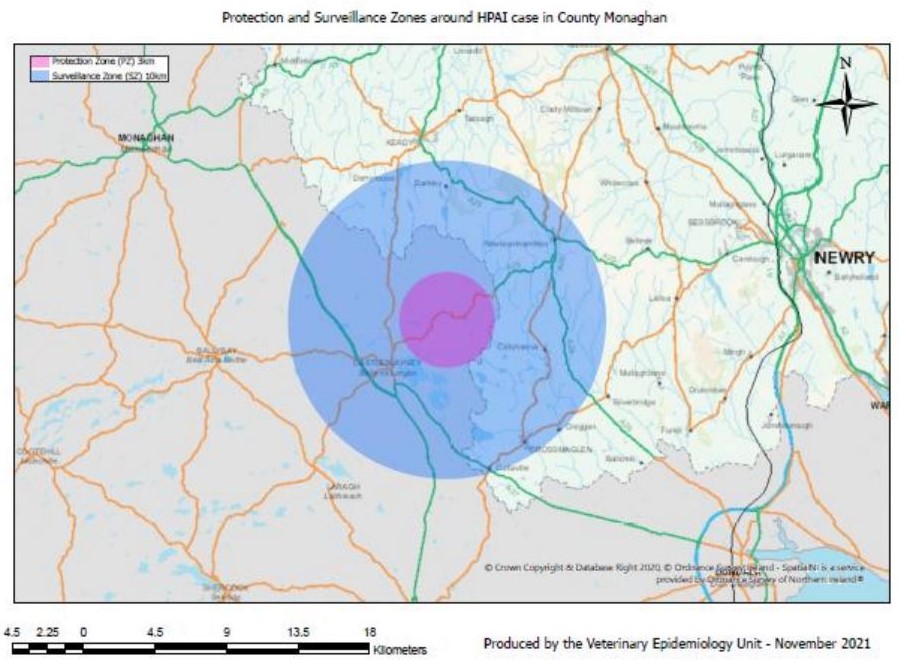A Temporary Control Zone (TCZ-B) has been declared in Northern Ireland effective immediately, following the confirmation of Avian Influenza H5N1 (bird flu) at a third premises in Co. Monaghan.
This third outbreak of bird flu is in commercial poultry, in the Castleblaney area of Co. Monaghan. The most recent outbreak is in an egg laying flock.
A 3km and a 10km Disease Control Zone has been put in place by the Department of Agriculture, Food and the Marine (DAFM) around the premises.
DAFM has expanded its protection and surveillance zones around the three flocks to further mitigate the risk of spread of the disease.
This places additional controls on the movement of poultry and poultry products within the zones. Movements into and out of the zones are also subject to licencing. Additional surveillance measures also apply within the restricted zones.
As the location of the premises lies close to the border between Monaghan and Armagh, the boundary of the 10km zone extends into Northern Ireland.
Therefore the chief veterinary officer (CVO) in Northern Ireland has taken the decision to take appropriate disease control measures to mitigate for onward disease spread.
Control zone
All moves within the TCZ-B are now required to be licenced according to Northern Ireland’s Department of Agriculture, Environment and Rural Affairs (DAERA).
Certain moves will be permitted under a licence issued by the department and a movement licencing centre will be established today (December 1, 2021).
Poultry owners are advised to contact the movement licensing centre via email for a specific licence application form at least 48 hours in advance of any planned move.

Avian influenza (AI), commonly known as bird flu, is a highly contagious viral disease affecting the respiratory, digestive and/or nervous system of many species of birds. It may also pose a threat to people and other animals in certain circumstances.
Avian influenza is a notifiable animal disease. DAERA has said: “If you keep poultry (including game birds or as pets) please remain vigilant for any signs of disease in your flock.
“If you have any concerns about the health of your birds please report it to your private veterinary practitioner. If notifiable disease is suspected, contact the DAERA Helpline on: 0300 200 7840, or your local DAERA Direct Regional Office. Failure to do so is an offence.”
People are also advised to contact the DAERA helpline on: 0300 200 7840 if you find one or more dead gulls, waders, ducks, geese, swans (webbed feet, long legs or long neck) or birds of prey.
Any other single dead birds do not need to be reported.
Spread of bird flu
In the Republic of Ireland, DAFM has said the spread of disease outside the previous restriction zones highlights the high risk of incursion of avian influenza into poultry flocks.
Stringent biosecurity, including housing or confinement of birds, is vital to mitigate the risk and protect poultry flocks across the island/country, according to DAFM.
As previously advised, the Health Protection Surveillance Centre (HPSC) has confirmed that although the H5N1 subtype can cause serious disease in poultry and other birds, no human infections with this virus have been reported in Europe and therefore risk to humans is considered to be very low.
Notwithstanding, DAFM said that members of the public are advised not to handle sick or dead wild birds. It is important to note that there is no evidence of risk associated with consumption of properly cooked poultry products.
Bird registration
DAERA has also advised that by law, bird keepers should register their birds. This applies to all birds, except those kept within a home.
This will enable the department to provide the bird owner with up-to-date information about avian influenza and measures which can be taken to prevent spread to your birds.
